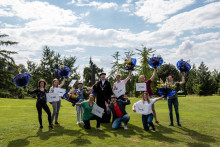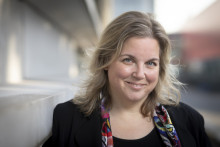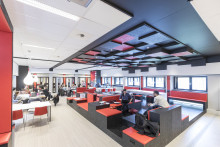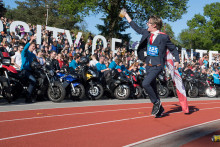Applied Physics student Sofie Kölling received a rare 10 for her graduation work. The jury of the Science & Technology faculty was nothing short of euphoric about her work, who ‘unanimously and indubitably’ identified her as the winner. In their nomination letter they mention that ‘for all aspects [of her work], Sofie reaches a level that other students can only aspire to reach’. And there’s more: ‘The critical articulation of the conclusions is striking and at a level that is normally only reached by far more experienced highly-talented scientists.’ Her results will be published in a prominent scientific journal.’ Kölling is currently a PhD candidate at the Interfaces and Correlated Electron Systems research group at the S&T faculty.
On behalf of the BMS faculty, Industrial Engineering and Management student Gelbrich Holsbrink received the award for her graduation work. Holsbrink conducted research into the optimal allocation of casualties to hospitals in the case of a mass-casualty incident. The faculty jury praised Holsbrink for the ‘high societal relevance’ of her work, while maintaining a high scientifical level. ‘A good representation and example of BMS research’, according to the jury.
Interaction Technology graduate Max Slutter was the winner on behalf of the EEMCS faculty. Slutter received a 9.5 for his thesis work and graduated cum laude. He explored the brain activity related to football players missing penalty kicks. According to the jury, Slutter combined brain research and sport in an innovative way, while coming up with a COVID-proof protocol in a (literal) field setting. His topic gaining a lot of media attention shows the relevance of his work, says the jury.
The jury from the ITC faculty named Yuhao Jiang the winner. She received a 10 for her thesis, in which she wrote about using mobile eye-tracking data for user research in geo-information science, and graduated with distinction (cum laude). According to the jury, her ‘masterly executed thesis’ was ‘very clearly written in a way that also allowed non-experts in the field to easily grasp what was done’.
Lastly, Floris Nijland, who studied Civil Engineering and Management won on behalf of the ET. He received a 9 for his thesis on ‘improving railway maintenance schedules by considering hindrance and capacity constraints’. The ET jury praised Nijland for his excellent elaboration, working on an innovative and autonomous topic and having a clear impact on a societally relevant problem.
Other awards
Besides the Graduation Awards, other awards were also presented during the Opening of the Academic Year. The TGS Award went to two winners: Jan Siemen Smink and Marit ten Hove. And after winning the finals a few months ago, Anne Leferink formally received the UT Education Award.







